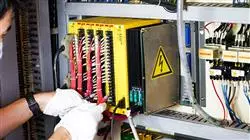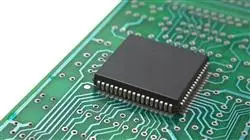University certificate
The world's largest faculty of engineering”
Introduction to the Program
By studying this TECH Postgraduate diploma, you will be up to date on the main advances in Instrumentation and Sensors in Electronic Systems, which will be fundamental to position you as one of the best electronic engineers of the moment”

Sensors are an essential part of electronic instrumentation, allowing the generation and measurement of electrical signals that can be understood by other operators, which undoubtedly allows effective connections between the two devices. Furthermore, the specialization in this field is highly demanded by engineers, since it opens the door to specific job opportunities. For this reason, many professionals, both recent graduates and those with years of experience, decide to continue their studies with specialized postgraduate programs to broaden their qualifications and become the most competitive engineers in the market.
In order to improve their qualification, TECH has created this Postgraduate diploma in Instrumentation and Sensors in Electronic Systems, which will enable engineers to get up to date on the specifications of these mechanisms, which are essential to achieve the necessary quality in electronic systems. A program designed by experienced professionals that will mark a turning point in the qualification of professionals.
This Postgraduate diploma analyzes the different types of sensors and actuators found in industrial processes and specifies the types of control systems in order to understand the intervention of an actuator device depending on a physical or chemical variable to be measured. Moreover, specialized knowledge is developed on the current applications of power electronics, specifically devices that allow variation of the waveform of the electrical signal, known as converters, which are present in sectors as varied as domestic, industrial, military or aerospace.
A 100% online program that will allow students to manage their own study time, meaning they are not hindered by by fixed schedules or the need to commute to another physical location. They can access all the contents at any time of the day, allowing them to balance their professional and personal life with their academic life.
The electronic engineering sector is looking for professionals like you, capable of adapting to the new times with the solvency of a top-level specialist”
This Postgraduate diploma in Instrumentation and Sensors in Electronic Systems contains the most complete and up-to-date program on the market. The most important features include:
- Case studies presented by engineering experts
- The graphic, schematic, and practical contents with which they are created, provide scientific and practical information on the disciplines that are essential for professional practice
- Practical exercises where the self-assessment process can be carried out to improve learning
- Special emphasis on innovative methodologies in Instrumentation and Sensors in Electronic Systems
- Theoretical lessons, questions to the expert, debate forums on controversial topics, and individual reflection assignments
- Content that is accessible from any fixed or portable device with an Internet connection
Improve your professional electronic sensor development skills with this program”
Its teaching staff includes professionals from the field of engineering, who contribute their work experience to this program, as well as renowned specialists from leading companies and prestigious universities.
Its multimedia content, developed with the latest educational technology, will allow professionals to learn in a contextual and situated learning environment, i.e., a simulated environment that will provide immersive specialization for real situations.
The design of this program focuses on Problem-Based Learning, by means of which students must try to solve the different professional practice situations that arise during the academic year. For this purpose, the student will be assisted by an innovative interactive video system created by renowned and experienced experts.
A cutting-edge teaching methodology to assist students’ learning"

The online format of this Postgraduate diploma will give you the opportunity to self-manage your study time"
Why study at TECH?
TECH is the world’s largest online university. With an impressive catalog of more than 14,000 university programs available in 11 languages, it is positioned as a leader in employability, with a 99% job placement rate. In addition, it relies on an enormous faculty of more than 6,000 professors of the highest international renown.

Study at the world's largest online university and guarantee your professional success. The future starts at TECH”
The world’s best online university according to FORBES
The prestigious Forbes magazine, specialized in business and finance, has highlighted TECH as “the world's best online university” This is what they have recently stated in an article in their digital edition in which they echo the success story of this institution, “thanks to the academic offer it provides, the selection of its teaching staff, and an innovative learning method aimed at educating the professionals of the future”
A revolutionary study method, a cutting-edge faculty and a practical focus: the key to TECH's success.
The most complete study plans on the university scene
TECH offers the most complete study plans on the university scene, with syllabuses that cover fundamental concepts and, at the same time, the main scientific advances in their specific scientific areas. In addition, these programs are continuously being updated to guarantee students the academic vanguard and the most in-demand professional skills. In this way, the university's qualifications provide its graduates with a significant advantage to propel their careers to success.
TECH offers the most comprehensive and intensive study plans on the current university scene.
A world-class teaching staff
TECH's teaching staff is made up of more than 6,000 professors with the highest international recognition. Professors, researchers and top executives of multinational companies, including Isaiah Covington, performance coach of the Boston Celtics; Magda Romanska, principal investigator at Harvard MetaLAB; Ignacio Wistumba, chairman of the department of translational molecular pathology at MD Anderson Cancer Center; and D.W. Pine, creative director of TIME magazine, among others.
Internationally renowned experts, specialized in different branches of Health, Technology, Communication and Business, form part of the TECH faculty.
A unique learning method
TECH is the first university to use Relearning in all its programs. It is the best online learning methodology, accredited with international teaching quality certifications, provided by prestigious educational agencies. In addition, this disruptive educational model is complemented with the “Case Method”, thereby setting up a unique online teaching strategy. Innovative teaching resources are also implemented, including detailed videos, infographics and interactive summaries.
TECH combines Relearning and the Case Method in all its university programs to guarantee excellent theoretical and practical learning, studying whenever and wherever you want.
The world's largest online university
TECH is the world’s largest online university. We are the largest educational institution, with the best and widest online educational catalog, one hundred percent online and covering the vast majority of areas of knowledge. We offer a large selection of our own degrees and accredited online undergraduate and postgraduate degrees. In total, more than 14,000 university degrees, in eleven different languages, make us the largest educational largest in the world.
TECH has the world's most extensive catalog of academic and official programs, available in more than 11 languages.
Google Premier Partner
The American technology giant has awarded TECH the Google Google Premier Partner badge. This award, which is only available to 3% of the world's companies, highlights the efficient, flexible and tailored experience that this university provides to students. The recognition as a Google Premier Partner not only accredits the maximum rigor, performance and investment in TECH's digital infrastructures, but also places this university as one of the world's leading technology companies.
Google has positioned TECH in the top 3% of the world's most important technology companies by awarding it its Google Premier Partner badge.
The official online university of the NBA
TECH is the official online university of the NBA. Thanks to our agreement with the biggest league in basketball, we offer our students exclusive university programs, as well as a wide variety of educational resources focused on the business of the league and other areas of the sports industry. Each program is made up of a uniquely designed syllabus and features exceptional guest hosts: professionals with a distinguished sports background who will offer their expertise on the most relevant topics.
TECH has been selected by the NBA, the world's top basketball league, as its official online university.
The top-rated university by its students
Students have positioned TECH as the world's top-rated university on the main review websites, with a highest rating of 4.9 out of 5, obtained from more than 1,000 reviews. These results consolidate TECH as the benchmark university institution at an international level, reflecting the excellence and positive impact of its educational model.” reflecting the excellence and positive impact of its educational model.”
TECH is the world’s top-rated university by its students.
Leaders in employability
TECH has managed to become the leading university in employability. 99% of its students obtain jobs in the academic field they have studied, within one year of completing any of the university's programs. A similar number achieve immediate career enhancement. All this thanks to a study methodology that bases its effectiveness on the acquisition of practical skills, which are absolutely necessary for professional development.
99% of TECH graduates find a job within a year of completing their studies.
Postgraduate Diploma in Instrumentation and Sensors in Electronic Systems.
If you are passionate about technology and want to specialize in the measurement and control of physical variables through instrumentation and sensors in electronic systems, the Postgraduate Diploma in Instrumentation and Sensors in Electronic Systems from TECH Global University is the perfect option for you. In this specialization program, you will learn to design, implement and maintain high-precision measurement and control systems for various applications, such as industry, medicine, robotics, home automation, among others. Through a theoretical and practical deepening, you will acquire the necessary knowledge in areas such as analog and digital electronics, microcontroller programming, selection and characterization of sensors, signal transduction, wireless communication, among other fundamental topics for instrumentation and sensors.
Become an expert in the measurement and control of physical variables through instrumentation and sensors in electronic systems.
You will have a highly qualified and experienced teaching team in the area, as well as state-of-the-art facilities and laboratories so that you can apply everything you learn in real and practical situations. Upon graduating from the Postgraduate Diploma in Instrumentation and Sensors in Electronic Systems, you will have the necessary skills and competencies to design and develop high-precision measurement and control systems, and you will be prepared to face the technological challenges of today and the future. Don't think twice and take the first step to design the future with cutting-edge technology. Enroll now!







